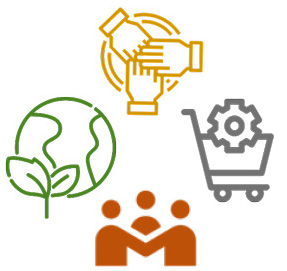King’s Anchor Programme
Supporting our local community to thrive
At King’s, we are committed to being an Anchor Institution and believe that we have an important role to play beyond the delivery of health and care. We employ over 15,000 people, spend around £1.6bn each year and have a responsibility to contribute towards the success of our diverse local communities. We also firmly believe in co-production and co-delivery, and therefore actively engage our communities and people to bring about a real and positive change.
Our mission
Our Anchor Programme’s mission is to support our local community to be healthy and to thrive.
Just as an anchor keeps a boat steady in the water, King’s College Hospital NHS Foundation Trust should act as an ‘Anchor Institution’ to provide support and stability in the local community, making the neighbourhood healthier and stronger. By investing locally, addressing climate issues, and working more closely with communities, we can help make the community better for everyone.
Our objectives
Widening participation
We’re aiming to reach our goal of 500 apprenticeships across the hospital. We’re also teaming up with nearby schools to create a program where students can get real work experience. Plus, we’re working on getting closer to the people in our community and building better relationships with others outside our organisation.
Community engagement
We are exploring how we can better work with community organisations, partners and representatives to ensure we are responsive to local needs, issues and opportunities. We are developing our plans through listening and collaborating with a variety of groups.
Social value procurement
Social value in procurement means that when we buy things or use services, we’re not just thinking about the price or quality. We’re also considering how these choices can make a positive impact on the people in our community and the area where we live.
Reducing our carbon footprint
We are making the hospital’s environmental footprint smaller by cutting down on the amount of carbon dioxide, waste and pollution we produce. We’re also working to boost the amount of materials we recycle, use less disposable plastic and minimise the effects of our travel. Read about the Trust’s Green Plan.
How we work
King’s role as an anchor organisation sits at the heart of our five-year strategy, as reflected through the title – ‘Strong Roots, Global Reach’. There is commitment across the organisation to strengthening and deepening connections with our local community, as we recognise that this is key to improving health outcomes and reducing inequalities
We work in a way that is collaborative, data driven and evidence-based, to ensure that we are leading a real and positive change for our people and communities.
We are collaborative
The Anchor Programme embraces all the factors that contribute to population health and the wider determinants of health and builds connections between the organisations that have a positive impact on local neighbourhoods. The Programme also works with the communities for co-production and co-delivery, understanding and addressing issues which are important to the people.
We are data-driven
We want to know that the time and resources we invest will make a real difference to people’s lives. So, using data effectively to generate insights is a fundamental part of our work.
We use data and analysis to identify the gaps, to deliver our interventions effectively and to measure the progress. A clear and succinct quantification of our impact also helps in continued support and commitment from our partners and donors.
We are evidence-based
Evidence from The Health Foundation and the World Health Organization shows that determinants such as income, education, quality of work, environment and social connections play a significant role towards a person’s life expectancy and the number of years they can expect to live in good health. Our work focuses on individual areas of need, but it’s firmly rooted in the overarching principle of building communities’ resources and resilience, and improving health and wellbeing for all.
Highlights of our work and successes for 2023/24
Widening participation
King’s Apprenticeship Programme
We have placed 260 apprenticeships across the hospital so far for 2023/24.
Find out what our apprenticeships think about our programme:
“The course has allowed me to appreciate how to better consider and promote equality, diversity, and inclusion in management and leadership. I have since modified my leadership approach to be more flexible and considered, which I hope will ultimately make a positive contribution to the experience of staff and patients.”
Amanda, Leadership and Management Level 3 Apprentice
“I learnt project management skills using both theoretical and practical examples. One practical example was supporting the King’s Day Nursery to move buildings, and another was the process of changing the curriculum for the children. The apprenticeship has given me more technical skills which will allow me to be a better manager, and more confidence and resilience after failing a module and was supported to persevere, study hard and pass the next time.”
Pauline, Associate Project Management Apprentice
“The apprenticeship has given me lots of transferable skills, such as time management, autonomy and managing different tasks. I’ve had a lot of small meaningful interactions with patients, which puts a smile on my face and gives me more motivation to work. I have also been supported by colleagues and managers to learn from mistakes that occur when working in a new environment. The apprenticeship has helped me feel more confident in my abilities and I am definitely open to a career at King’s or in the NHS.”
Stefan, Business Administrator Level 3 Apprentice
Work experience
We are providing a work experience scheme to promote King’s and the NHS as a future employer. So far 190 students have participated. We partner with local councils, schools and colleges to set up visits and joint employer days to encourage young people to consider a career in healthcare.
Project SEARCH
King’s partnered with DFN Project SEARCH to offer work experience to over 50 young adults with learning disabilities and/or autism. This has led to employment offers at King’s.
Volunteering at King’s
In 2022/23, 70,066 volunteer hours were supported across King’s. This is equivalent to salary costs of £837,000 at London Living Wage.
Innovation
Through the SC1 London Life Sciences Innovation District we partner with local healthcare Trusts, King’s College London and our local boroughs to provide jobs which develop new cutting-edge innovations to improve patient care.
Community engagement
Social mobility
King’s has been promoting social mobility through various programmes. We have launched the King’s Social Mobility Champions Programme which aims to build up a database of volunteers in the first year. Seventy-six volunteers signed up at the launch event. King’s has also helped to establish a Sector Based Work Academy Programme pilot with Lambeth College, with 17 student graduates.
Charitable work
The Trust provides facilities and space to the charity The Listening Place to provide services for patients at risk of suicide. We have also been working closely with the charity Redthread for more than 10 years to deliver our Youth Violence Intervention Programme. This helps young people break out of the cycle of violence they sometimes find themselves in.
Investment
We are focusing our capital estates projects and investment in the most deprived parts of our boroughs to support local economic growth. In 2021 we leased space in the newly redeveloped Loughborough Junction and Camberwell High Street.
Social value procurement
We are meeting the NHSE minimum 10% social value weighting included within tenders to improve procurement opportunities for local small and medium enterprises and voluntary, community and social enterprises to do business with King’s.
Reducing our carbon footprint
Clean Air Plan
We launched a joint Clean Air Plan with Guy’s and St Thomas’ NHS Foundation Trust to support a healthier local environment for our community.
The key pollutants which are harmful to health are measured across all of our main sites to allow us to monitor reductions in these pollutants (known as air quality monitoring). Data from a number of these sensors is available on the Breathe London website.
Our new patients records system flags patients who are admitted from areas of high air pollution and provides information for clinicians and patients. Training will also be provided to clinicians to empower them to have patient-centred conversations around air pollution and health.
Zero emission transport
Our fleet electrification programme aims to switch all Trust fleet vehicles to zero emission in line with the NHS Net Zero Travel and Transport Strategy. We have had a 7% increase in electric vehicles in our fleet in 2022/23 and 2023/24.
E-cargo bikes will be introduced at six additional locations across King’s College Hospital and Guy’s and St Thomas’ NHS Foundation Trusts and a staff ‘Green Travel Network’ has been set up. In addition to improving air quality, active travel has positive impacts on health and wellbeing.

